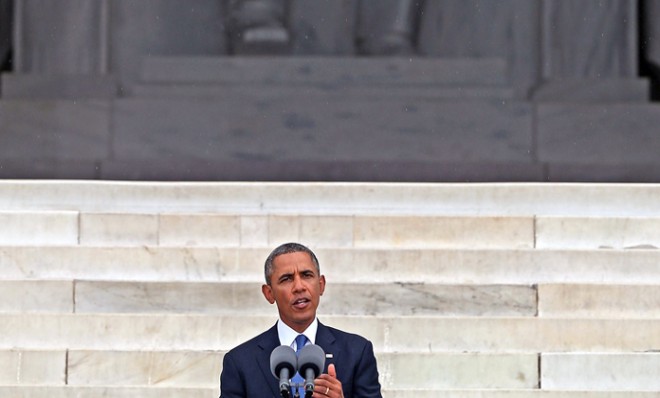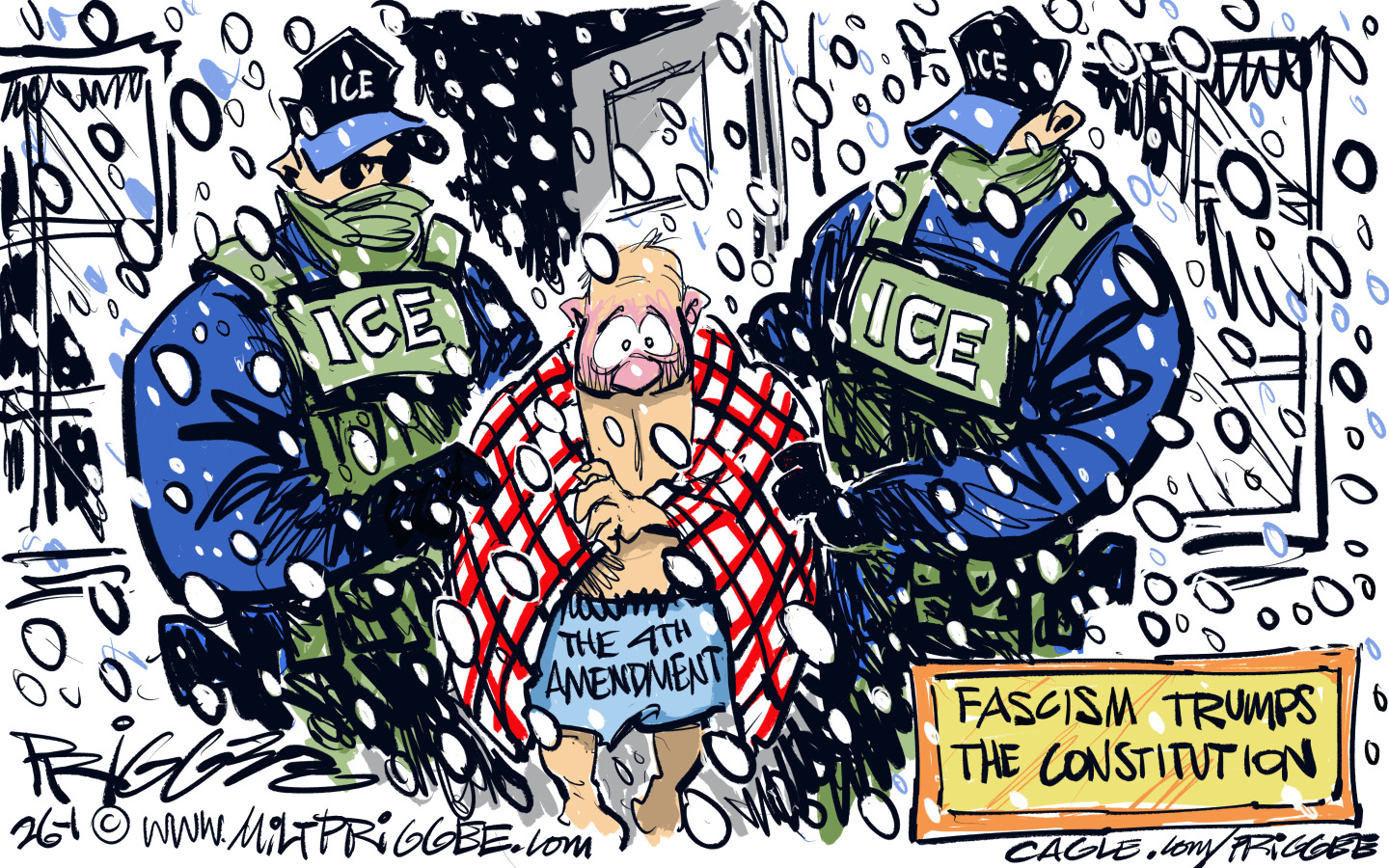Fifty years after King's speech, Obama still walks a fine line on race
Dreams of a "post-racial" America are still far from reality, as evidenced by the response to Obama's handling of racial issues


In a speech commemorating the March on Washington, President Obama on Wednesday said that to "dismiss the magnitude" of the progress made since the Civil Rights movement would be to "dishonor the courage and the sacrifice of those who paid the price to march." Yet he also recognized that much is still left to be done, saying, "The arc of the moral universe may bend towards justice, but it does not bend on its own."
It would appear that most Americans would agree with that sentiment. Less than half of all Americans think the U.S. has made "substantial" progress toward realizing the dream Martin Luther King Jr. laid out in his famous speech fifty years ago, according to a new Pew survey. And roughly half of all Americans — including eight in ten African-Americans — said "a lot" still needs to be done to make that dream a reality.
President Obama's election in 2008 was a landmark moment, with many hailing the dawn of a "post-racial" America. Yet Obama's presidency has only spawned more division over issues of race, and prompted questions about whether the president himself has inflamed or salved that racial divide.
The Week
Escape your echo chamber. Get the facts behind the news, plus analysis from multiple perspectives.

Sign up for The Week's Free Newsletters
From our morning news briefing to a weekly Good News Newsletter, get the best of The Week delivered directly to your inbox.
From our morning news briefing to a weekly Good News Newsletter, get the best of The Week delivered directly to your inbox.
"Right after the election of the president, I would have thought it was going in a positive direction, but I am not so sure anymore," Rep. Marcia Fudge (D-Ohio), chair of the Congressional Black Caucus, told The Hill this week.
Americans generally agree with that notion, per Pew's findings. The percentage of Americans who felt blacks were better off than they had been five years prior shot up dramatically after Obama's election. African-Americans in particular felt better about their situation than they had at any point since the mid-1980s.
Just five years later, however, the fuzzy feeling has disappeared.
While many expected Obama to ease racial tension, many conservatives have contended that he has, in fact, polarized the issue by framing it through his own experience. That was especially the case after Obama self-identified with Trayvon Martin, the unarmed black teen who was shot dead by George Zimmerman, and talked openly about about how young African-Americans still feel they are treated unfairly.
A free daily email with the biggest news stories of the day – and the best features from TheWeek.com
"Victim in chief is no role for a president," the Washington Post's Kathleen Parker wrote. By explicitly identifying himself with Martin on a racial basis, "he essentially gave permission for all to identify themselves by race with the victim or the accused," she argued.
"How sad, as we approach the 50th anniversary of the march Martin Luther King Jr. led on Washington, that even the president resorts to judging not by the content of one's character but by the color of his skin — the antithesis of the great dream King articulated," she added.
Similarly, National Review's John R. Lott Jr. said Obama had needlessly "interjected" race into the Martin case.
However, Obama was hardly the first to discuss race in the Martin case. It was explicitly racial from the outset, with most of the discussion centered more on Martin's race than, say, Florida's stand your ground law.
It would be "absurd to write as if Obama himself is the one 'interjecting' race into stories that were already national news and racially fraught before he ever commented on them," wrote The Atlantic's Conor Friedersdorf. More important, he wrote, was that Obama had simply "made a concerted effort to speak in a way that brings people together and reduces polarization."
Unfortunately, polarization may be an unavoidable consequence of the president's race and unique platform.
On the campaign trail ahead of the 2008 election, Obama felt it necessary to deliver a sweeping speech on race. While he has taken great pains to avoid the topic as president, he has also delved back into that thorny topic in a handful of speeches and off-the-cuff remarks. Yet whenever he has done so, listeners have often left with an impression tailored to their political leanings. They "have typecast [Obama] according to their own fears and expectations of a black man in the White House," wrote the New York Times' Bill Keller.
When Obama said Martin "could have been me 35 years ago," liberals saw a president passionately lamenting racism; conservatives, on the other hand, accused him of being racist himself and of "ginn[ing] up racial melee." In other instances, while progressives cheered Obama's talk of "fairness," Newt Gingrich saw signs of "Kenyan, anti-colonial" thinking.
The Atlantic's Ta-Nehisi Coates identified this same problem in a lengthy analysis last year of how Obama had to perform a tricky balancing act on race. The minute Obama first spoke out on the Martin case, Coates wrote, the conversation "passed out of its national-mourning phase and lapsed into something darker and more familiar — racialized political fodder."
More from Coates:
The irony of Barack Obama is this: He has become the most successful black politician in American history by avoiding the radioactive racial issues of yesteryear, by being "clean" (as Joe Biden once labeled him) — and yet his indelible blackness irradiates everything he touches. This irony is rooted in the greater ironies of the country he leads. For most of American history, our political system was premised on two conflicting facts — one, an oft-stated love of democracy; the other, an undemocratic white supremacy inscribed at every level of government. In warring against that paradox, African Americans have historically been restricted to the realm of protest and agitation. But when President Barack Obama pledged to "get to the bottom of exactly what happened," he was not protesting or agitating. He was not appealing to federal power — he was employing it. The power was black — and, in certain quarters, was received as such. [The Atlantic]
Jon Terbush is an associate editor at TheWeek.com covering politics, sports, and other things he finds interesting. He has previously written for Talking Points Memo, Raw Story, and Business Insider.
-
 31 political cartoons for January 2026
31 political cartoons for January 2026Cartoons Editorial cartoonists take on Donald Trump, ICE, the World Economic Forum in Davos, Greenland and more
-
 Political cartoons for January 31
Political cartoons for January 31Cartoons Saturday's political cartoons include congressional spin, Obamacare subsidies, and more
-
 Syria’s Kurds: abandoned by their US ally
Syria’s Kurds: abandoned by their US allyTalking Point Ahmed al-Sharaa’s lightning offensive against Syrian Kurdistan belies his promise to respect the country’s ethnic minorities
-
 The billionaires’ wealth tax: a catastrophe for California?
The billionaires’ wealth tax: a catastrophe for California?Talking Point Peter Thiel and Larry Page preparing to change state residency
-
 Bari Weiss’ ‘60 Minutes’ scandal is about more than one report
Bari Weiss’ ‘60 Minutes’ scandal is about more than one reportIN THE SPOTLIGHT By blocking an approved segment on a controversial prison holding US deportees in El Salvador, the editor-in-chief of CBS News has become the main story
-
 Has Zohran Mamdani shown the Democrats how to win again?
Has Zohran Mamdani shown the Democrats how to win again?Today’s Big Question New York City mayoral election touted as victory for left-wing populists but moderate centrist wins elsewhere present more complex path for Democratic Party
-
 Millions turn out for anti-Trump ‘No Kings’ rallies
Millions turn out for anti-Trump ‘No Kings’ ralliesSpeed Read An estimated 7 million people participated, 2 million more than at the first ‘No Kings’ protest in June
-
 Ghislaine Maxwell: angling for a Trump pardon
Ghislaine Maxwell: angling for a Trump pardonTalking Point Convicted sex trafficker's testimony could shed new light on president's links to Jeffrey Epstein
-
 The last words and final moments of 40 presidents
The last words and final moments of 40 presidentsThe Explainer Some are eloquent quotes worthy of the holders of the highest office in the nation, and others... aren't
-
 The JFK files: the truth at last?
The JFK files: the truth at last?In The Spotlight More than 64,000 previously classified documents relating the 1963 assassination of John F. Kennedy have been released by the Trump administration
-
 'Seriously, not literally': how should the world take Donald Trump?
'Seriously, not literally': how should the world take Donald Trump?Today's big question White House rhetoric and reality look likely to become increasingly blurred
